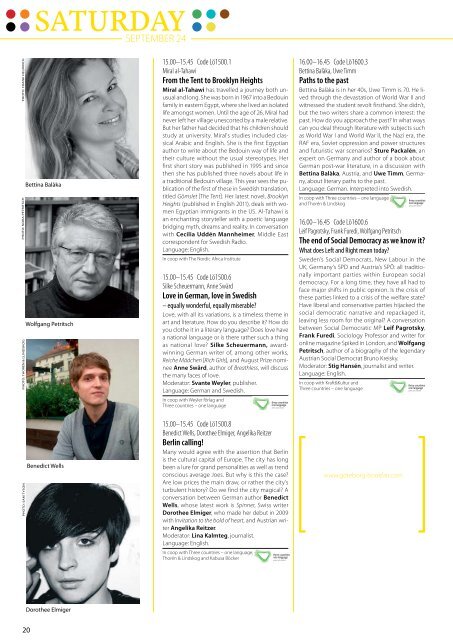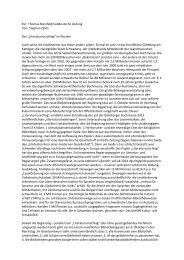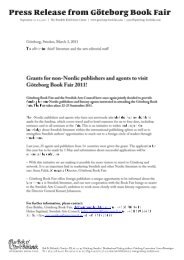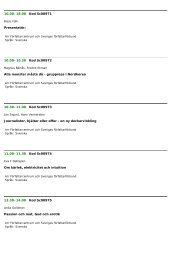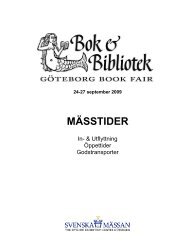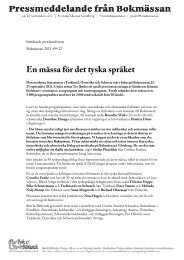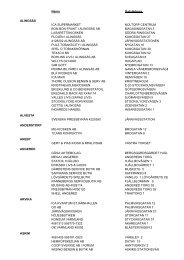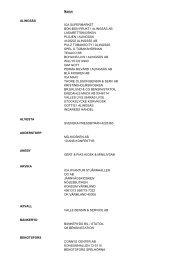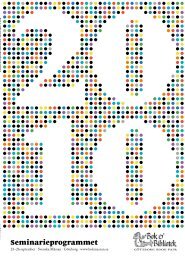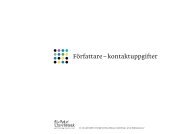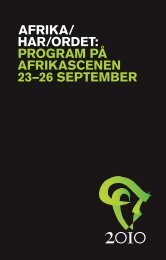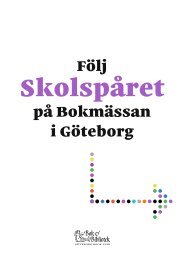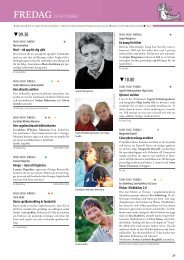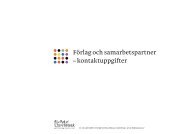PDF-document, 3,5 MB - Bok & Bibliotek
PDF-document, 3,5 MB - Bok & Bibliotek
PDF-document, 3,5 MB - Bok & Bibliotek
You also want an ePaper? Increase the reach of your titles
YUMPU automatically turns print PDFs into web optimized ePapers that Google loves.
Saturday<br />
september 24<br />
Photo: FRANK HELmrich<br />
Photo: Nora Petritsch<br />
Photo: THORÉn & LLINDSKOG<br />
Bettina Balàka<br />
Wolfgang Petritsch<br />
15.00–15.45 Code Lö1500.1<br />
Miral al-Tahawi<br />
From the Tent to Brooklyn Heights<br />
Miral al-Tahawi has travelled a journey both unusual<br />
and long. She was born in 1967 into a Bedouin<br />
family in eastern Egypt, where she lived an isolated<br />
life amongst women. Until the age of 26, Miral had<br />
never left her village unescorted by a male relative.<br />
But her father had decided that his children should<br />
study at university. Miral's studies included classical<br />
Arabic and English. She is the first Egyptian<br />
author to write about the Bedouin way of life and<br />
their culture without the usual stereotypes. Her<br />
first short story was published in 1995 and since<br />
then she has published three novels about life in<br />
a traditional Bedouin village. This year sees the publication<br />
of the first of these in Swedish translation,<br />
titled Gömslet [The Tent]. Her latest novel, Brooklyn<br />
Heights (published in English 2011), deals with women<br />
Egyptian immigrants in the US. Al-Tahawi is<br />
an enchanting storyteller with a poetic language<br />
bridging myth, dreams and reality. In conversation<br />
with Cecilia Uddén Mannheimer, Middle East<br />
correspondent for Swedish Radio.<br />
Language: English.<br />
In coop with The Nordic Africa Institute<br />
15.00–15.45 Code Lö1500.6<br />
Silke Scheuermann, Anne Swärd<br />
Love in German, love in Swedish<br />
– equally wonderful, equally miserable<br />
Love, with all its variations, is a timeless theme in<br />
art and literature. How do you describe it How do<br />
you clothe it in a literary language Does love have<br />
a national language or is there rather such a thing<br />
as national love Silke Scheuermann, awardwinning<br />
German writer of, among other works,<br />
Reiche Mädchen [Rich Girls], and August Prize nominee<br />
Anne Swärd, author of Breathless, will discuss<br />
the many faces of love.<br />
Moderator: Svante Weyler, publisher.<br />
Language: German and Swedish.<br />
16.00–16.45 Code Lö1600.3<br />
Bettina Balàka, Uwe Timm<br />
Paths to the past<br />
Bettina Balàka is in her 40s, Uwe Timm is 70. He lived<br />
through the devastation of World War II and<br />
witnessed the student revolt firsthand. She didn't,<br />
but the two writers share a common interest: the<br />
past. How do you approach the past In what ways<br />
can you deal through literature with subjects such<br />
as World War I and World War II, the Nazi era, the<br />
RAF era, Soviet oppression and power structures<br />
and futuristic war scenarios Sture Packalén, an<br />
expert on Germany and author of a book about<br />
German post-war literature, in a discussion with<br />
Bettina Balàka, Austria, and Uwe Timm, Germany,<br />
about literary paths to the past.<br />
Language: German. Interpreted into Swedish.<br />
In coop with Three countries – one language<br />
and Thorén & Lindskog<br />
16.00–16.45 Code Lö1600.6<br />
Leif Pagrotsky, Frank Furedi, Wolfgang Petritsch<br />
The end of Social Democracy as we know it<br />
What does Left and Right mean today<br />
Sweden's Social Democrats, New Labour in the<br />
UK, Germany's SPD and Austria's SPÖ: all traditionally<br />
important parties within European social<br />
democracy. For a long time, they have all had to<br />
face major shifts in public opinion. Is the crisis of<br />
these parties linked to a crisis of the welfare state<br />
Have liberal and conservative parties hijacked the<br />
social democratic narrative and repackaged it,<br />
leaving less room for the original A conversation<br />
between Social Democratic MP Leif Pagrotsky,<br />
Frank Furedi, Sociology Professor and writer for<br />
online magazine Spiked in London, and Wolfgang<br />
Petritsch, author of a biography of the legendary<br />
Austrian Social Democrat Bruno Kreisky.<br />
Moderator: Stig Hansén, journalist and writer.<br />
Language: English.<br />
In coop with Kraft&Kultur and<br />
Three countries – one language<br />
In coop with Weyler förlag and<br />
Three countries – one language<br />
Photo: Sam Tyson<br />
Benedict Wells<br />
15.00–15.45 Code Lö1500.8<br />
Benedict Wells, Dorothee Elmiger, Angelika Reitzer<br />
Berlin calling!<br />
Many would agree with the assertion that Berlin<br />
is the cultural capital of Europe. The city has long<br />
been a lure for grand personalities as well as trend<br />
conscious average Joes. But why is this the case<br />
Are low prices the main draw, or rather the city’s<br />
turbulent history Do we find the city magical A<br />
conversation between German author Benedict<br />
Wells, whose latest work is Spinner, Swiss writer<br />
Dorothee Elmiger, who made her debut in 2009<br />
with Invitation to the bold of heart, and Austrian writer<br />
Angelika Reitzer.<br />
Moderator: Lina Kalmteg, journalist.<br />
Language: English.<br />
In coop with Three countries – one language,<br />
Thorén & Lindskog and Kabusa Böcker<br />
www.goteborg-bookfair.com<br />
Dorothee Elmiger<br />
20


